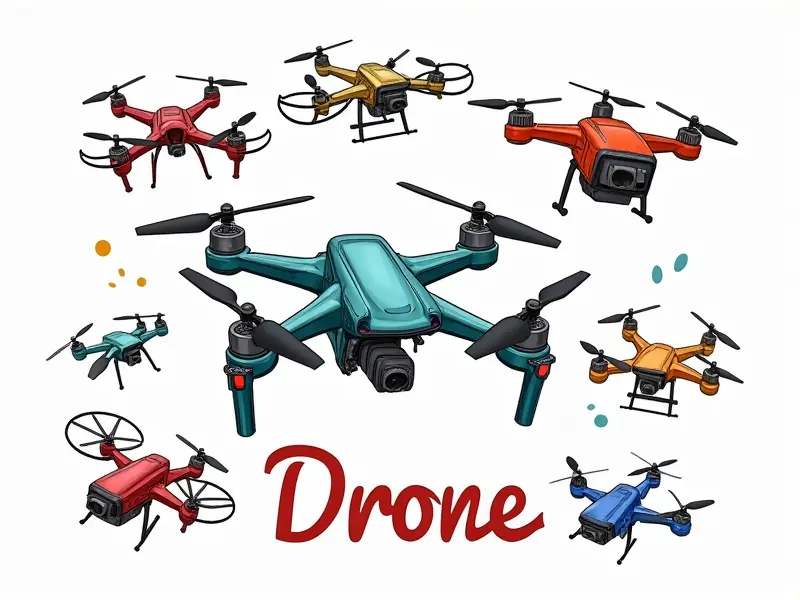What are ESCs for drones?

Understanding Drone ESCs: The Basics
Electronic Speed Controllers (ESCs) are critical components in drone technology, playing a pivotal role in the performance and control of unmanned aerial vehicles. An ESC regulates the speed of brushless motors by converting DC power from the battery into AC power that drives the motor's coils. This conversion allows precise control over the drone’s flight dynamics.
How Do ESCs Work in Drones?
The operation of an ESC involves receiving signals from the flight controller and adjusting the voltage supplied to the motors accordingly. When a command is sent, such as increasing or decreasing speed, the ESC modifies the electrical current to match the desired output. This process ensures that the drone can perform intricate maneuvers with precision.
Key Components of an ESC
- BEC (Battery Eliminator Circuit): Serves as a power source for onboard electronics, reducing reliance on separate battery packs.
- MOSFETs: High-efficiency switches that convert DC to AC current.
Choosing the Right Drone ESC
Selecting an appropriate ESC is crucial for optimal drone performance. Factors such as motor size, battery voltage, and desired flight characteristics should be considered when choosing an ESC. High-quality ESCs often come with features like telemetry data transmission, which enhances real-time monitoring capabilities.
Factors to Consider
- Motor Type: Brushless motors require specific ESC configurations compared to brushed motors.
- Battery Capacity: The ESC must match the battery's voltage and current rating.
- Duty Cycle: Reflects the proportion of time an ESC is active versus inactive during a full cycle.
Importance of Quality Drone ESCs
A reliable ESC can significantly impact flight stability, efficiency, and safety. High-quality ESCs typically offer better heat dissipation, durability, and resistance to electrical noise. Investing in top-tier components ensures smoother operation and extended longevity.
Benefits of Top-Quality ESCs
- Better Heat Management: Prevents overheating and prolongs ESC lifespan.
- Durability: Withstands harsh environmental conditions without compromising performance.
- Noise Reduction: Limits interference with other drone components, maintaining signal integrity.
Troubleshooting Common ESC Issues
Frequent problems encountered with ESCs include overheating, electrical noise, and malfunctioning signals. Proper diagnosis and maintenance can mitigate these issues. Regularly checking connections, ensuring adequate airflow, and using high-quality components are essential practices.
Common Troubleshooting Tips
- Inspect Connections: Ensure all wires are securely fastened to prevent intermittent failures.
- Cooling Solutions: Implement heat sinks or additional cooling mechanisms for overheating ESCs.
- Maintain Firmware Updates: Keep ESC firmware up-to-date to address known issues and improve performance.
Upgrading Your Drone's ESC System
Enhancing your drone’s ESC system can unlock new levels of performance. Upgrades may involve replacing standard ESCs with more advanced models featuring telemetry, higher current ratings, or improved efficiency. These enhancements contribute to a more robust and versatile flying experience.
Potential Enhancements
- Telemetry Integration: Allows real-time monitoring of ESC performance data.
- Better Heat Dissipation: Incorporating advanced cooling solutions to prevent overheating.
- Higher Current Ratings: Selecting ESCs capable of handling higher current loads for more powerful motors.
ESC Specifications: What to Look For
When evaluating ESC specifications, focus on parameters like continuous and burst current ratings, battery compatibility, and input voltage range. Understanding these details helps in making informed decisions that align with your drone’s requirements.
Vital Specifications
- Continuous Current Rating: The maximum constant current the ESC can handle without overheating.
- Burst Current Rating: The peak current an ESC can deliver for short durations.
- Battery Input Voltage Range: Determines compatibility with various battery types and voltages.
Unpacking the Role of ESCs in FPV Racing
In First-Person View (FPV) racing, ESCs play a crucial role by enabling rapid acceleration and deceleration necessary for competitive edge. High-performance ESCs are essential to achieve quick response times and maintain stability during high-speed maneuvers.
Key Considerations for FPV Racing
- Rapid Response Time: Necessary for instant motor control during racing.
High-performance ESCs must effectively manage heat to prevent thermal shutdowns and ensure continuous operation under intense conditions.
Maximizing Drone Performance with ESCs
To optimize your drone’s performance, it is crucial to select ESCs that complement the overall system. Matching motor specifications, ensuring proper cooling, and using high-quality components are key steps towards achieving peak efficiency and reliability.
Tips for Maximizing Performance
- Match Motor Specifications: Select ESCs compatible with your motors' power requirements.
- Proper Cooling: Incorporate effective cooling solutions to prevent overheating and maintain optimal performance.
Invest in reputable ESC manufacturers known for durability and reliability, ensuring longevity of your drone system.
ESC Explained: Function & Importance
In summary, Electronic Speed Controllers (ESCs) are indispensable components that control the speed and direction of brushless motors in drones. They enable precise flight dynamics by converting DC power to AC current, ensuring smooth operation and enhanced performance.
Conclusion
The role of ESCs in drone technology cannot be overstated. From basic operations to advanced applications like FPV racing, high-quality ESCs are vital for optimal performance, reliability, and safety. By understanding the intricacies of ESC functionality and choosing the right components, you can elevate your drone’s capabilities to new heights.

